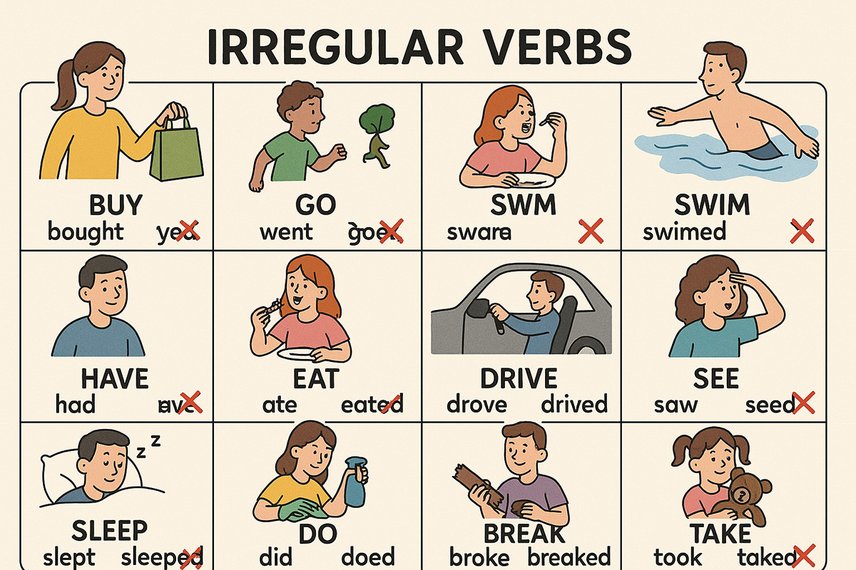Why Irregular Verbs Matter More Than You Think
When English learners think about grammar, irregular verbs often feel like a frustrating exception. Unlike regular verbs that follow simple rules, irregular verbs change unpredictably — go – went – gone, see – saw – seen, take – took – taken. But here’s the truth: irregular verbs are everywhere, especially in the English you hear on screens every day.
Let’s break down why they matter — and prove it with real quotes from the movies and series you love.
Irregular Verbs = Everyday Speech
You might think you can get by without mastering all those strange verb forms. But in reality, irregular verbs make up a huge part of daily conversation. Verbs like go, have, get, come, take, say, and make are all irregular — and essential.
Example from Friends
“We were on a break!” — Ross
(verb: be – was/were – been)
This one iconic line uses two irregular verbs — be and break. And it’s repeated countless times throughout the show.
Emotions and Action Are Told Through Irregular Verbs
When characters fall in love, fight, travel, lie, or learn — irregular verbs are in the center of the action.
Example from The Lord of the Rings
“I thought I had strayed into a dream.” — Boromir
(verbs: think – thought, stray – strayed, have – had)
Notice how the weight of emotion is carried by irregular forms — thought, had.
Irregular Verbs Reflect Real-Life Tenses
Most irregular verbs are irregular in the past simple or past participle forms — tenses that we use all the time when telling stories, sharing news, or describing experiences.
Example from Harry Potter and the Sorcerer’s Stone
“I’ve seen that scar before.” — Professor Quirrell
(verb: see – saw – seen)
You’ll hear this structure (have + past participle) in almost every show or film.
They Add Rhythm and Identity to Dialogue
Irregular verbs are short, punchy, and often monosyllabic — perfect for dramatic or emotional delivery.
Example from The Dark Knight
“You either die a hero, or you live long enough to see yourself become the villain.” — Harvey Dent
(verbs: die – died, live – lived, see – saw – seen, become – became – become)
Note how see and become carry the weight of that philosophical punch.
Even Comedy Depends on Them
Jokes and comedic timing often rely on concise verb choices — and irregular verbs dominate there too.
Example from The Office (US)
“I knew exactly what to do. But in a much more real sense, I had no idea what to do.” — Michael Scott
(verb: know – knew – known, have – had)
Without knew, this line wouldn’t land the same way.
Conclusion: Learn Irregulars, Learn Real English
If you're serious about understanding native speech — not just reading textbooks — you must master irregular verbs. They are the backbone of emotional storytelling, comedy, conflict, and conversation.
The good news? You don’t have to memorize boring lists. Instead, listen, watch, read, and notice how often these verbs show up in real dialogue. Try repeating quotes from your favorite scenes. The more context you have, the faster they’ll stick.
Start with the verbs you hear the most. And next time someone says “I saw that coming” or “He’s gone too far,” you’ll not only understand them — you’ll be ready to answer.
And the best way to study is to use irregular verbs flashcards, which will quickly and effectively increase your level.

